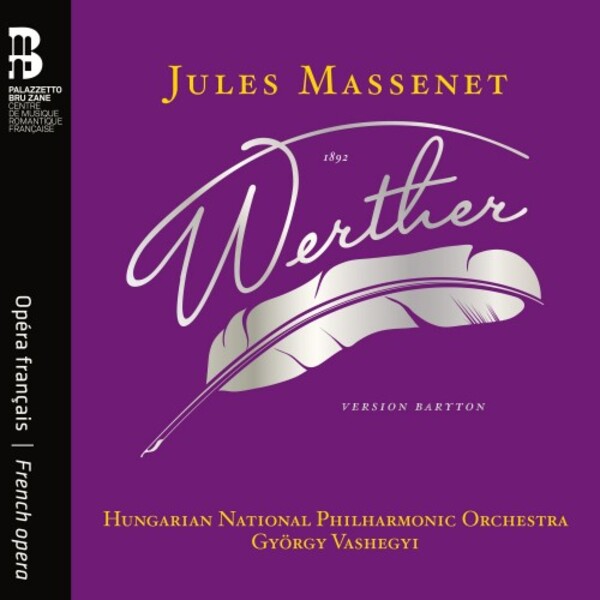MASSENET Werther (Vashegyi)
View record and artist detailsRecord and Artist Details
Genre:
Opera
Label: Bru Zane
Magazine Review Date: 07/2024
Media Format: CD or Download
Media Runtime: 126
Mastering:
DDD
Catalogue Number: BZ1056

Tracks:
| Composition | Artist Credit |
|---|---|
| Werther |
Jules (Emile Frédéric) Massenet, Composer
Artavazd Sargsyan, Schmidt, Tenor Children’s Choir of the Zoltán Kodály Hungarian Choir School György Vashegyi, Conductor Hélène Carpentier, Sophie, Soprano Hungarian National Philharmonic Orchestra Laurent Deleuil, Johann; Brühlmann, Baritone Matthieu Lécroart, Le Bailli, Bass-baritone Tassis Christoyannis, Werther, Baritone Thomas Dolié, Albert, Baritone Véronique Gens, Charlotte, Soprano |
Author: Tim Ashley
Some will doubtless raise eyebrows at Bru Zane’s inclusion of Werther in their ongoing re-evaluation of the lesser-known French repertory. In this instance, however, it is the edition rather than the work that forms the primary focus, as this beautiful set gives us the rarely heard baritone version, first performed, with Mattia Battistini in the title-role, in Warsaw in 1901. The familiar original was first heard in Vienna in 1892, when Werther was sung by the Belgian tenor Ernest van Dyck, a noted Wagnerian. In France, however, the role initially proved beyond the capabilities of several singers considered for it, and Massenet is known to have begun a revision for the baritone Victor Maurel that was also to recast Albert as a tenor: it came to nothing when the tenor Guillaume Ibos was deemed adequate for the task of the Paris premiere in 1893. Battistini himself, however, later approached the composer with a request for a baritone version of his own, though on this occasion, Massenet avoided wholescale revision in favour of an extensive reworking of Werther’s vocal line, leaving the rest of the opera intact. Some of the score as we have it is now thought to be Battistini’s work rather than Massenet’s.
The edition has divided opinion over time. We already have a performance on DVD from 2004 with Thomas Hampson, Susan Graham and the Toulouse orchestra under Michel Plasson, and John Steane, reviewing it for Gramophone (A/06), argued that it ‘enfeebled’ the original. Listening to the new set, I can’t, frankly, think that it does, but rather gives us a different experience, much as we find with the multiple editions of Orphée et Eurydice, Don Carlos or Tannhäuser. Without a tenor soaring over the orchestra at some of the climaxes, the score becomes more muted, more reined in, and what for many is primarily a star vehicle is transformed into something closer to a conversation piece without losing its dark intensity of emotion or drama.
The recording certainly accentuates the differences. The prevailing mood is one of deep, contained sadness. Conductor György Vashegyi unnervingly ratchets up the tension without by and large resorting to grand gestures, though there are sudden moments of terrifying force in the final acts as Charlotte begins to confront the catastrophic consequences of her actions. It’s superbly played with great subtlety of orchestral detail, always placed at the service of psychological development. The murmuring strings as Werther contemplates nature in Act 1 hint at incipient instability, while the trudging strings and slithering clarinets that underpin the frigid colloquy between Charlotte and Albert in Act 2 lay bare the as yet unacknowledged rot in their marriage.
There’s not a weak link anywhere in the cast, either, and crucially, we can hear every word, and hear it given meaning. Tassis Christoyannis and Véronique Gens, as Werther and Charlotte, have done little finer. His mezza voce, honeyed and reflective, sounds poetically dreamy and introverted at the start, yet it is also a sound we eventually come to distrust, as it heralds flashes of turbulence and desperation, gradually building to something darkly obsessive in the Ossian setting. Gens, meanwhile, digs deep into Charlotte’s inner anguish. On a first hearing, the letter scene feels overwhelming, a real descent into a psychological maelstrom. Listen again and its power is undimmed, but you also notice the relative restraint with which it’s actually done.
There are fine things elsewhere. Most telling, perhaps, is the casting of a lyric soprano, Hélène Carpentier, as Sophie, rather than the usual shallow twitterer, suggesting greater awareness of the tragedy around her than we usually find. Thomas Dolié’s Albert is rightly passionless and stiff without being smug, which makes him more sympathetic than some. Matthieu Lécroart makes a bluff yet warm-hearted Bailli, while Artavazd Sargsyan and Laurent Deleuil sing lyrically and without caricature as Schmidt and Johann. It’s an outstanding achievement, in short, that makes the strongest possible case for this particular version, while affording us opportunities to rethink the opera itself. Very highly recommended.
Discover the world's largest classical music catalogue with Presto Music.

Gramophone Digital Club
- Digital Edition
- Digital Archive
- Reviews Database
- Full website access
From £8.75 / month
Subscribe
Gramophone Full Club
- Print Edition
- Digital Edition
- Digital Archive
- Reviews Database
- Full website access
From £11.00 / month
Subscribe
If you are a library, university or other organisation that would be interested in an institutional subscription to Gramophone please click here for further information.




